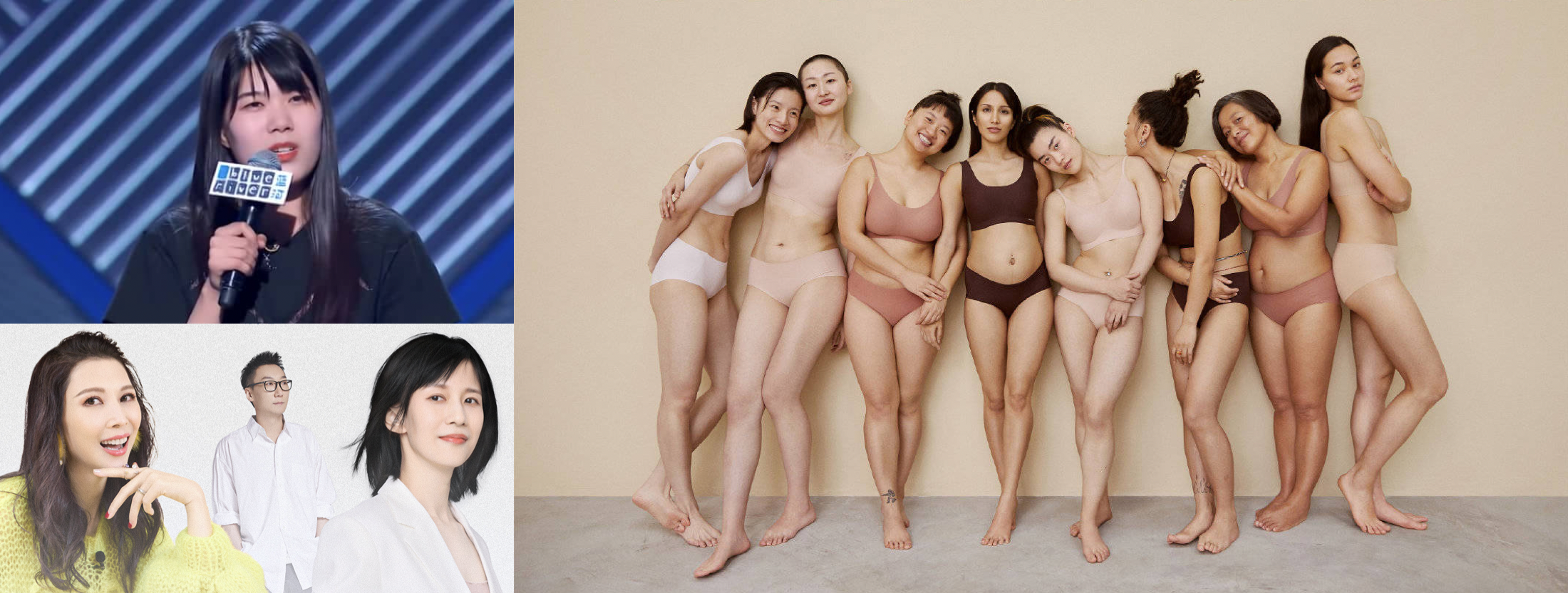The modern feminist movement in China started to grow after the Fourth World Conference on Women in Beijing in 1995. Within two decades, grassroots feminism became mainstream. It started with protests against arranged marriages which went digital in 2015. From blog posts to social media platforms, gender issues gradually turned into politics, and calls for pursuing gender equality got increasingly louder. Meanwhile, China’s feminism movement online has faced backlash and started what some Chinese netizens have called a “gender war”.
How is feminism perceived in China?
On Chinese social media platforms, there are many different synonyms for feminism, and Chinese netizens holding different attitudes towards feminism subsequently use different terms. Below are some of the more precise Chinese terms and definitions that feminism in China.
女权 (feminism) is the broadest term for feminism on the Chinese Internet. Searching the keyword “feminism” in Baidu index, one can find that it is strongly related to “women’s punch”, “gender equality”, “social events”, “social phenomena” and other terms.
女拳 (women’s punch) is used with very strong negative overtones. It is used by people accusing women of demanding excessive privileges. The word can often be seen in gender controversies discussions on social media. It represents the act of “punching,” which refers to a person’s statements that contain “offensive” ideas, in this case asking for more privileges. The person who “punches” is stigmatized as a “female puncher”.
女权主义 (feminism & activisms) Stands for both the concept of feminism and the feminist movement, 女权主义 is perceived as a neutral word and is mostly used online to describe the feminist movement and discuss topics like the #Metoo movement and related social events. For example, the case of Xuanzi and Zhu Jun, which was trending on Weibo for a long time or the stand-up comedian Yangli and brands related to her (#HowToSeeTheBoycottofYangli) that gathered over 280 million readings and 184 thousand discussions.
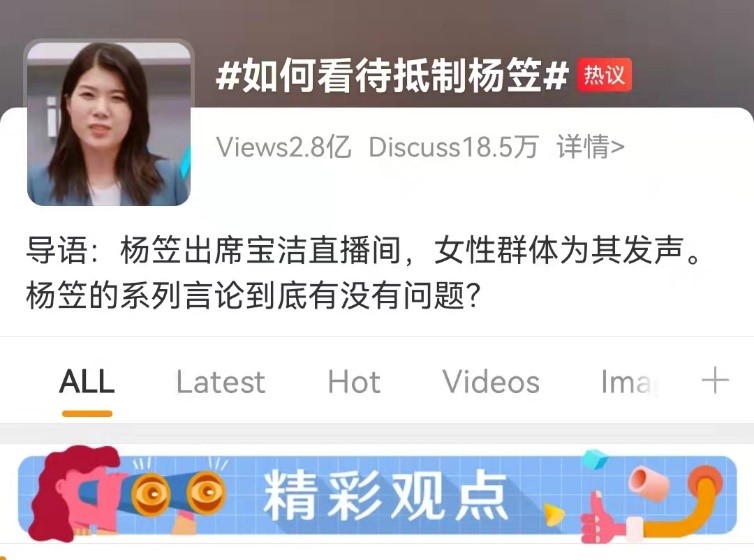
女性主义 (feminism theories in China & feminist movements conducted by elites) 女性主义 is the disciplinary term for China’s indigenous gender studies. Some netizens use the term 女性主义to distinguish from 女拳 (women’s punch), in an attempt to suggest that the moderate actions of well-educated women are the right way to promote gender equality, while grassroots female empowerment is the source of emotional incitement and gender antagonism.
“How marriage impacts women” – trending hashtag on Weibo
On April 6th, 2022, a tagline hit Weibo’s trend list: “What is the impact of marriage towards women?”(#婚姻给女性带来了哪些影响#), has been reviewed over 59 million times and sparked heated debates from netizens on Weibo.

The tag was created by a Chinese Reality show called “Send 100 Girls Home”(送一百位女孩回家). Produced by Sohu, a Chinese online video and streaming service platform, the show describes itself as “a relationship healing show for urban women”. The show features urban-living women from different backgrounds on their way home from work, chat with them about life, aiming to understand their goals and feelings.
In the show, the host asked two women what the impact of marriage is on them. The first respodnent, Ada Choi, a famous Hong Kong actress, referred to keeping the feeling of “romantic love” even after entering a marriage. The second respondent, Papi Jiang, a female comedian who was known for her entertainment and relationships-related content, described her marriage life as “having two computers facing each other – her and her husband each watching TV shows on their computers, but occasionally communicate with each other to keep connected”.
How did netizens react?
Chinese netizens expressed mixed feelings about the two modes of marriage. Many were especially cynical toward Choi’s “romantic marriage”. One trending comment said that “Not everyone is lucky enough to meet good guys like her husband” and some expressed disappointment about the prejudice of only featuring privileged women like celebrities and ignoring women with lower social status. More comments referred to how marriages “bring women pain”, especially when it comes to child-raising.
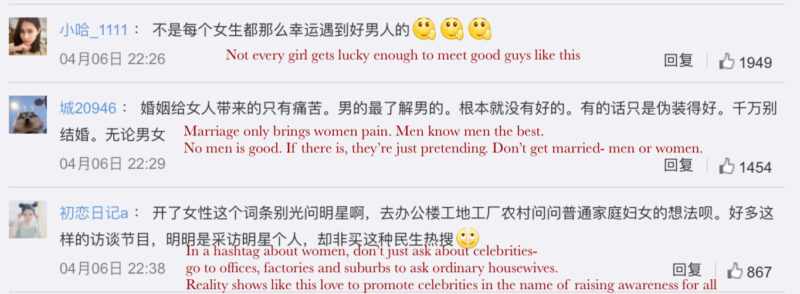

The controversial Yang Li sparked online “gender wars”
Yang Li is a Chinese female stand-up comedian whose talk show – “Why are men so ordinary yet so confident?” sparked controversy in December 2020.

Chinese netizens have interpreted this line differently. For some, who are sensible to the feminist cause, Yang’s lines are a well-deserved critic of toxic masculinity. For others, she is accused of “provoking gender antagonism” for the sake of attention. Therefore, there have been demands to ban her from social media and to boycott her show. When she endorsed the microprocessor brand Intel, there was a fierce backlash from some netizens which resulted in Yang Li eventually revoking her endorsement.
Intel got caught into a gender equality controversy on Chinese social media
On March 18th 2021, Intel’s official Weibo account for consumer products, @IntelCorePinHub, made a promotion post with a poster and a video featuring Yang Li and her male partner Rock. In the promotional video, Yang Li said, “Intel has a taste for laptops that is better than my taste for men.” Some Chinese netizens took offense that Intel used Yang Li as the spokeswoman. While others scoffed at her message, arguing that she was festering gender antagonism.

After the controversy started to spread on Chinese social media, Intel deleted their Weibo post, and all promotional materials featuring Yang Li on their Taobao store. Intel later made a statement, “We have noticed that the promotional content related to Yang Li has caused widespread controversy, and this situation is not what we expected. Diversity and inclusion are an important part of Intel’s culture. We fully recognize and value the diverse world we live in and are committed to working with partners from all walks of life to create an inclusive workplace and social environment.”
However, Intel’s statement only added oil to the fire, with some female netizens expressing outrage at Intel’s withdrawal. Meanwhile, some male netizens rallied at another of Yang Li’s endorsement events (a live stream on JD.com for P&G’s pads products for periods). They called her a sow and demanded that customer service ban her.
How can brands leverage women empowerment amid the Chinese online landscape
A few months after Intel’s incident, Mercedes-Benz posted a short video featuring Yang Li on Weibo on October 14th, 2021, with labels of “the new long-wheelbase C-Class” and “in your comfort zone” to promote the product. The original source of the video was VOGUE official. In addition to Yang Li, there were other celebrities featured in the series of videos which were all forwarded by Mercedes-Benz officials on the same day.
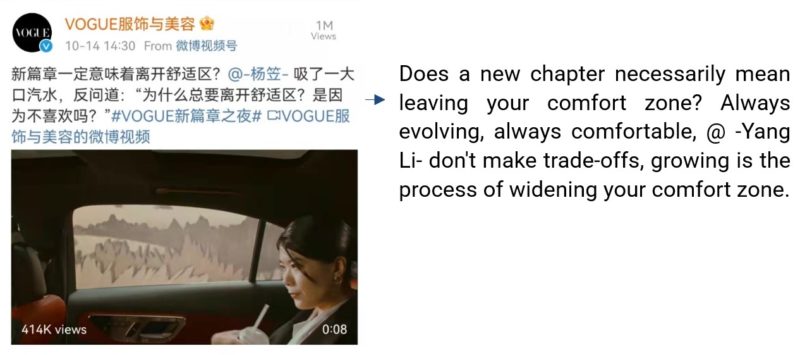
Just like with the Intel ad, the reception on social media was mixed and sparked fierce debates. The battle ended with Mercedes-Benz setting that video visible for followers only, and Yang Li stating on Weibo that she was not endorsing Mercedes-Benz.
Not long after, on November 3rd, 2021, BVLGARI launched a new campaign featuring Yang Li on their official Weibo which gathered 82 thousand likes and 9,650 reposts. The post made it to the list of top-trending topics on Weibo that day. In the post, BVLGARI acclaimed, “The definition of DIVA, is on you. @-Yangli-. Be yourself and be the resounding rose that never dies when you wear Bulgari #Divas’ Dream collection jewelry.” The post received acclaim from women and Yang Li’s fans.
The difference in reception between BVLGARI’s advertisement campaign and Benz’s or Intel’s is that BVLGARI’s target audience is predominantly women. Although Mercedes-Benz had succeeded in women empowering marketing with their 2015 campaign She’s Mercedes, men are still the core consumers of automotive products. In Yang Li’s advertisement case, the core value Mercedes Benz was trying to convey was vague.
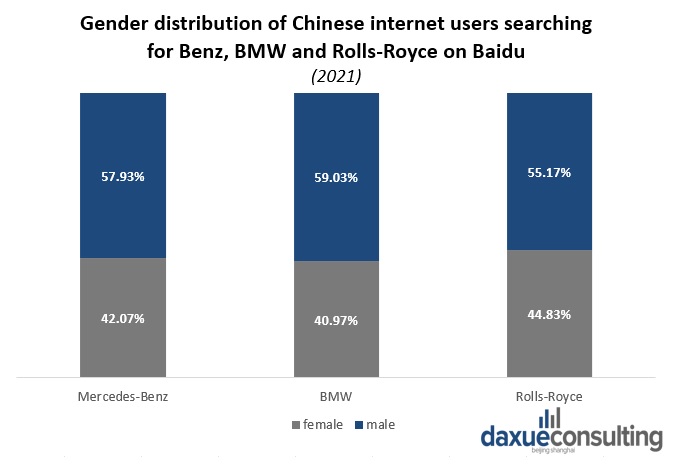
As for Intel’s advertisement featuring Yang Li, the lack of relevance of the message to the product combined with the company backing off and not standing behind its values ended up pleasing no one.
Neiwai: a case study of feminist advertising that succeeded in China
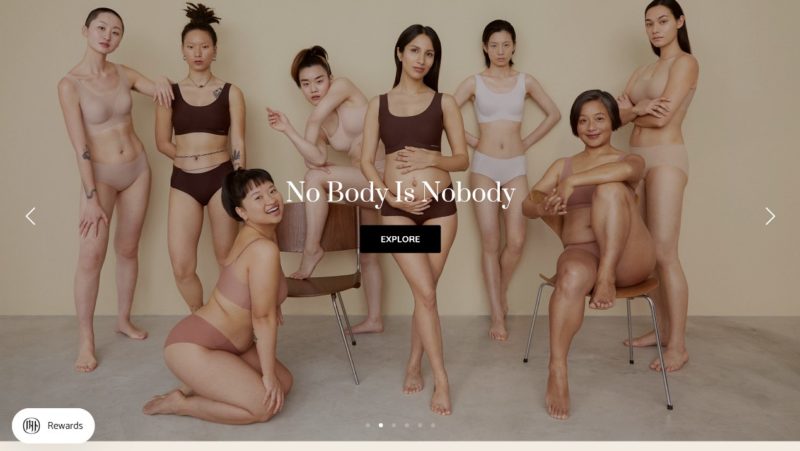
Neiwai is a domestic women’s underwear brand that focuses on comfort and beauty, they have three main lines of products: lingerie, lounge, and active underwear. The brand values women’s diverse body shapes and focuses on women’s freedom in its advertising. Singer Faye Wong, model Du Juan, and dancer Tan Yuan Yuan are officially representing Neiwai, shaping its brand image to be spiritual and artsy.
The brand’s name evokes the Chinese idiom, 内外兼修(Nei Wai Jian Xiu), which praises women for being elegant and well-mannered. In 2021, Neiwai also launched a body positivity campaign, aiming at freeing body shame to empower women. In the same series of posters, they also expressed the liberation of women’s bodies and minds through showing natural women’s bodies in ads, including women’s freedom to show their armpit hair, minority women and their uniqueness, and overall body acceptance. Through this series of ads, Neiwai broke the industry’s codes that usually feature skinny models.
What makes a women empowerment marketing campaign successful in China?
Neiwai’s body positivity campaign is in tune with women’s daily life and resonates with a large feminine audience in China. Similarly, campaigns taking on social issues affecting women have been well received. In 2016, SKII’s #Change Destiny campaign ad pointing at the marriage market in China got viral. In the video, SKII touches on marriage and women’s freedom of choice versus their family’s expectations. Campaigns based around subjects with a broad appeal to many women like the ones Neiwai and SKII touched on in their campaigns have garnered an overall positive reception in China. Even more so when they are used for promoting products with a predominantly female user base.
Takeaways about feminism in China
According to JD Worldwide, the purchasing power of women in lower-tier Chinese cities is increasing rapidly. As a result, brands can be tempted to dabble in feminism marketing. However, Chinese women are not a homogenous group, and class, age, and personal beliefs will have an impact on people’s position regarding feminism marketing.
Social media has also become a critical source for the Chinese feminist dialogue, as women share their experiences of gender discrimination, domestic violence, and sexual assault to fight gender inequality.
The rise of feminism presents both opportunities and challenges for brands in China. Nevertheless, feminist movements online often receive strong backlashes, including insults, arguments, and censorship. Likewise, the trending tagline on Weibo and “gender wars” sparked by recent campaigns show that brands should be cautious of societal issues and take a measured and appropriate stance.


